Film, TV and Radio courses at Salford
Are you passionate about Film, TV and Radio?
We’ve designed our Film, TV and Radio courses in partnership with the industry to ensure the skills you learn with us are relevant and transferable.
We have a state-of-the-art campus at MediaCity, the north-west's leading digital and creative hub. That means that, when you study with us, you’ll be surrounded by the BBC, ITV and over a hundred media companies.
Read on to find out what courses we offer, and where they could take you.
Ready to launch your professional career?
When you study a Film, TV and Radio course, you’ll be able to specialise in the areas that interest you, undertake live briefs and real-world assignments, and learn from tutors who are experienced in a whole range of jobs in the industry. And at the end of it all, you’ll graduate with a portfolio of work and the confidence you’ll need to make an impact from day one of your new career.
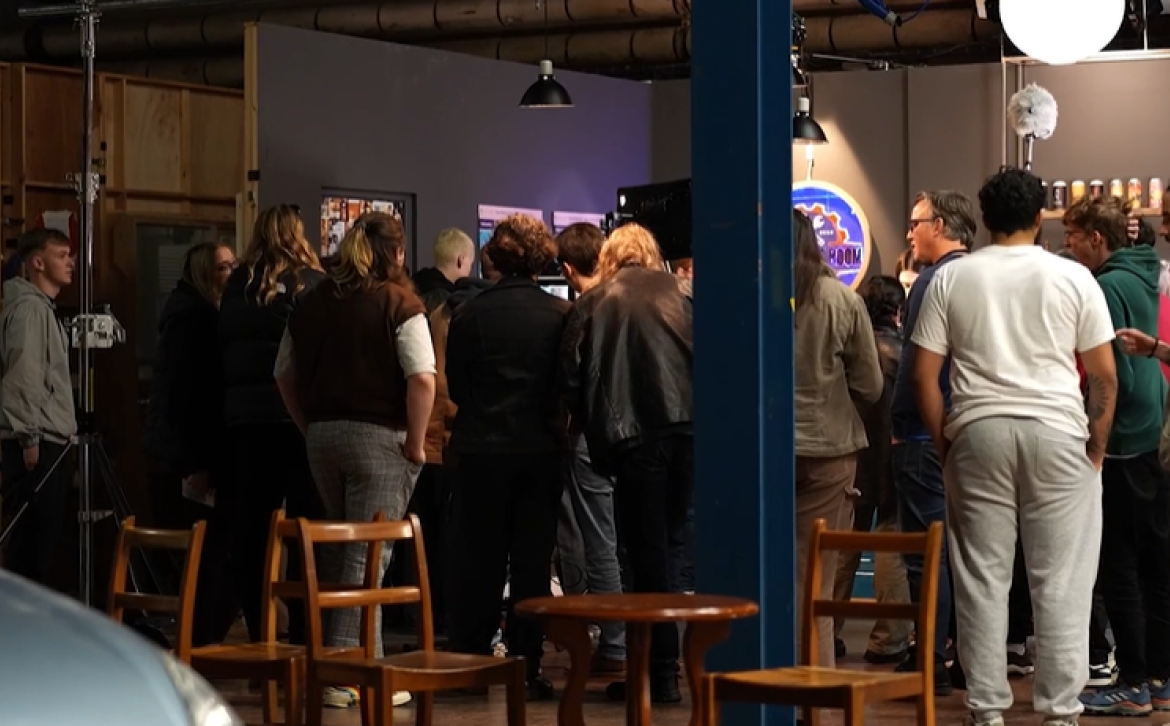
Undergraduate courses
Spend three years exploring the areas of film, TV or radio which interest you. You’ll gain an understanding of the general skills you’ll need, and as you progress you’ll get the chance to shape your degree how you want to.
- BA (Hons) English and Film
- BA (Hons) Digital Video Production and Marketing
- BA (Hons) Editing and Visual Effects for Film and Broadcast
- BA (Hons) Film Studies
- BA (Hons) Film Production
- BA (Hons) Television and Radio Production
You can also explore our Creative Digital Media and Gaming Courses
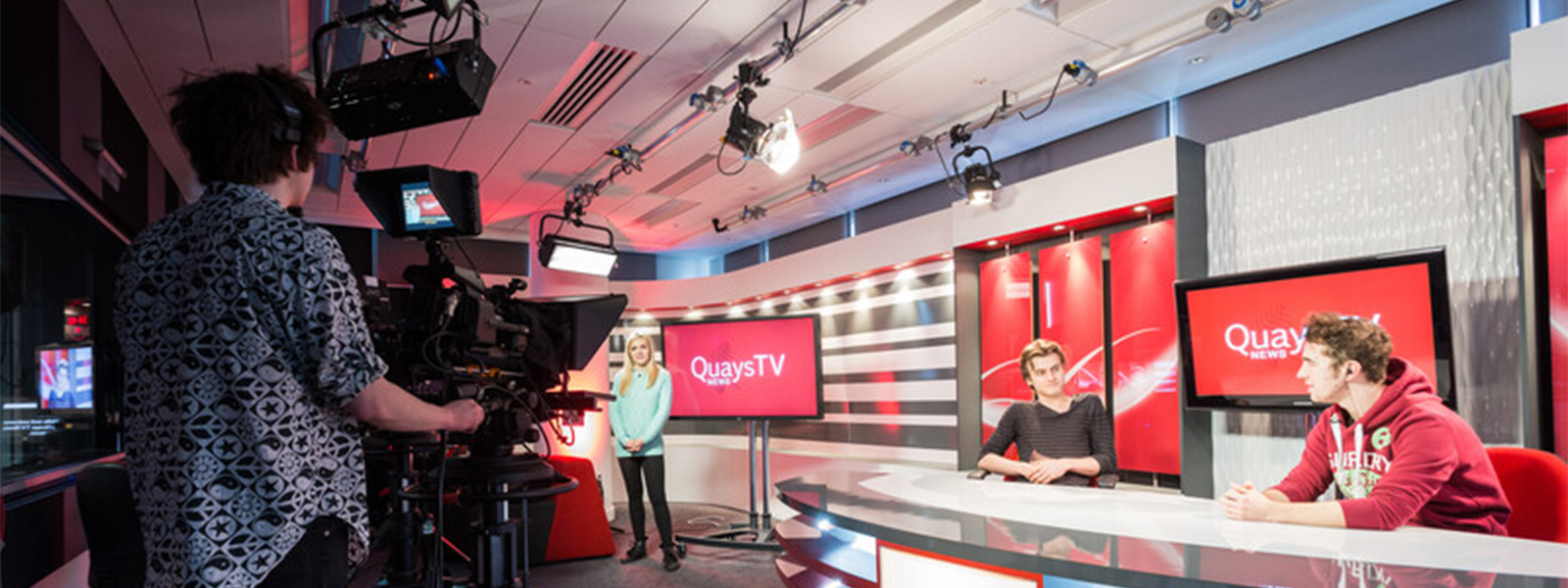
Postgraduate courses
These courses will allow you to build on your undergraduate and work experiences so far, to further develop your skills and job prospects in a specific area.
- MA Digital Video Production and Marketing
- MA Film Production
- MA Documentary Production for TV, Film and Digital Media
- MA Drama Production for TV, Film and Digital Media
- MA Editing for TV, Film and Digital Media
- MA Wildlife Documentary Production
- MA Production Management for TV, Film and Digital Media
You can also explore our Creative Digital Media and Gaming Courses
FAQs
Will there be networking events and opportunities to meet employers during my studies?
There are many networking opportunities and we actively encourage all our students to take advantage of these whenever they can, whether this be simply introducing yourself to a guest speaker during a masterclass, attending RTS events that take place in MediaCity, or other such opportunities. Professional Practice, a module on Film Production and Television and Radio Production, for example, also encourages students to undertake some work experience and this is an additional and invaluable way to begin to develop that important contacts list.
Are your Film, TV and Radio degree courses on social media?
Film production students and staff regularly podcast and post content on their Instagram channel.
Our students also have a podcast on Spotify.
Will we get to see the ITV and BBC studios?
We have very strong industry links so there are many opportunities to visit but this will depend on their availability. We have many guest speakers from industry who regularly come to give lectures to students and many MediaCityUK based companies often offer work experience/internships to our students.
Are there any additional costs apart from course fees?
No, everything you need for your studies is provided. There are ample editing suites, cameras and equipment. You may wish to purchase their own laptop and hard drive, but these are personal choices.
What is a typical week like for a Television and Radio Production student?
Your week will have three taught sessions for each module. There are some variations, in your first year you will have three modules in semester one and two each will have minimum of three hour teaching a week. On top of this some may have additional sessions e.g. Radio Production which has additional studio sessions. In addition there are craft skills workshops open to everyone and run on a rolling schedule throughout the year. We also have other activities such as Utter Radio (in house radio station), Quays TV and our MediaCity specific production unit (ICZ).
What is a typical week like for a Film Production student?
In the first year you will be attending a range of classes that introduce you to filmmaking. In Semester 1 these are; Intro to Film Making, Intro to Scriptwriting, Intro to Film Analysis. In Semester 2 you will do; Cinematic Practice and Production, Intro to Professional Practice and Intro to Film Theory. After the first year you can choose a variety of modules that will either help you on your career pathway or fulfil your interest in specific areas of Film Production. In your week you will be attending a range of seminars and workshops and spending time completing your assignments and filmmaking.
Is the option of a semester or year abroad available on the Film, TV and Radio courses?
On some courses, you can do one semester or two semesters (a year) at one of our partner institutions. These are in America, Australia and Europe. They include; Middle Tennessee State, Northern Ohio, Columbia College and Royal Melbourne Institute of Technology. We also have exchange opportunities in Finland, Netherlands and Italy.
How do I know which course to pursue?
We understand that choosing a degree can be difficult. Start by thinking about which area of film, TV and media interests you, and what job you can see yourself doing in the future. You’ll then be able to see which of our courses match up best with your ambitions.
However, it’s important to remember that with most degrees the skills you learn are transferable to other disciplines and when you graduate with us, you’ll have learnt a full range of skills to prepare you enter this fast-paced industry.
Which influential alumni have graduated from your Film, TV and Radio degree courses?
Many of our graduates and alumni have shaped successful careers within the film, TV, radio, media and creative sectors. One of which is Rob Bagshaw, a proud graduate from the University of Salford. Read Rob’s story from how he went from a student to TV Executive. Another is Adam Simcox whose work was bought by Netflix.
Explore our facilities
When you study Film, TV and Radio with us, you’ll get access to industry-standard facilities in our MediaCity building. The facilities are geared towards helping you harness your creativity, with everything from flexible TV, radio and Digital Media spaces to 3D printers. Not sure how something works? Don’t worry, our team of experts will ensure you'll get the most out of using our Film, TV and Radio facilities at the University of Salford.
You can explore some of the facilities you could be using right now by visiting our virtual platform.
Our Film, TV and Radio Facilities
TV studios
Our TV studios are industry-standard, so much so that they are actually used by the industry. The BBC have used them for a variety of broadcasts, such as the Olympics and Christmas music concerts, and they’re equipped with the same audio-visual systems used by the ITV and Sky too.
The studios have green screen facilities (more on those below) as well as basic props so you can design and build sets for a range of projects, from game shows to news broadcasts.
All these studios link to our control rooms and the feeds can either be edited in the control rooms and transmitted live, or saved and edited at a later date.
They contain eight Sony HXC 500 HD broadcast cameras, a Sony DWX wireless microphone system and a ETC ION Lighting Desk with robotic lighting. Not sure what that all means yet? Don’t worry, at this point you just need to know that it’s a similar set up to that used by the BBC, ITV and Sky so when you secure your first job at a broadcaster, you’ll feel right at home from day one.
Green screen facilities
These allow you to create effects such as those you see on weather reports and incorporates a camera system and 3D graphics software.
They are the same standard as those used by broadcasters and production companies, and are used by the BBC to produce programmes such as those on children’s TV. When this happens, you’ll often get the chance to support, giving you hands-on experience of real productions.
Audio production
We’ve got all the hardware and software you need to make sure you’ll know just how to create, edit, mix and master audio for film, television and animation. Our main studios feature Avid S6 consoles – a similar set up to those at our MediaCityUK neighbours, such as Dock10 and ITV.
Elsewhere, we have Mac suites where you can use and learn the software used by the professionals, as well as a dedicated foley studio, an audio production and post-production suite, a dubbing theatre and several edit suites.
It all means that you’ll have plenty of opportunity to learn all aspects of audio production and find your niche.
MakerSpace
Depending on your course, you may need to create a range of physical items, from product prototypes to models for stop-go animation.
Our MakerSpace is available for you to bring your designs to life using 3D scanners and printers, power tools and a range of art and craft materials. Experienced technicians are also on hand to show you how everything works and make sure you know exactly how to get the best from the equipment.
Stop-frame studio
Interested in stop-frame animation? You’ll be able to use one of our five animation booths equipped with industry standard lighting, grip, software and cameras and learn just what it takes to make your ideas and storyboards a reality.
Computer Suites and Editing Studios
Our dedicated editing suites will allow you to learn and excel in all elements of post-production work. They feature 4k monitors and 5.1 surround sound systems, so you can pick out all details of your work as you create your masterpiece, as well as all the software you’ll need and use when you start your career.
This includes Avid Media Composer (used for editing much of the broadcast TV you’ll see), Da Vinci Resolve (used for colour finishing across a range of TV programmes) as well as Adobe Creative Cloud.
Equipment stores
Cameras, lighting kits and mics – they’re all essential to media production. But don’t worry, you won’t need to spend thousands of pounds to get the set-up you need – we have a fully equipped equipment store available for you to use and take out industry-standard kit.
From the Panasonic VariCam (used to film Netflix shows such as Ozark and Orange is the New Black) to the ARRI Alexa (as used on The Mandalorian) and a host of other kit from companies like Canon, AKG and Sennheiser, you’ll be able to shoot and record on location in the high quality you need to bring your vision to life.
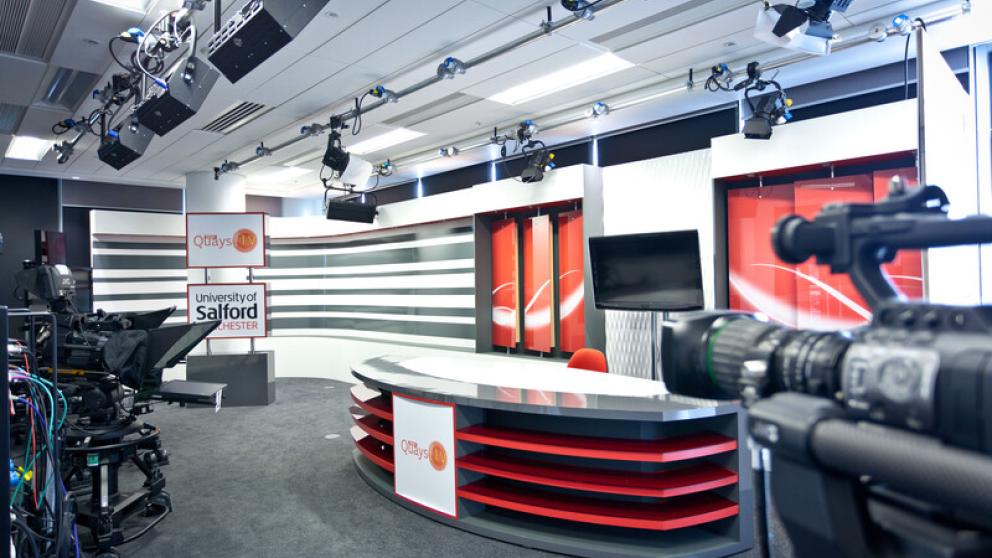
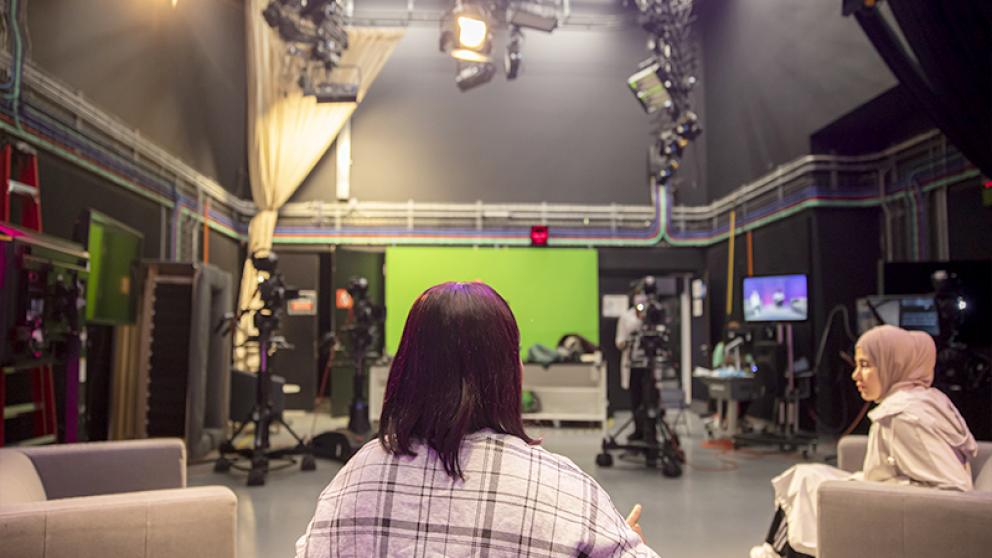
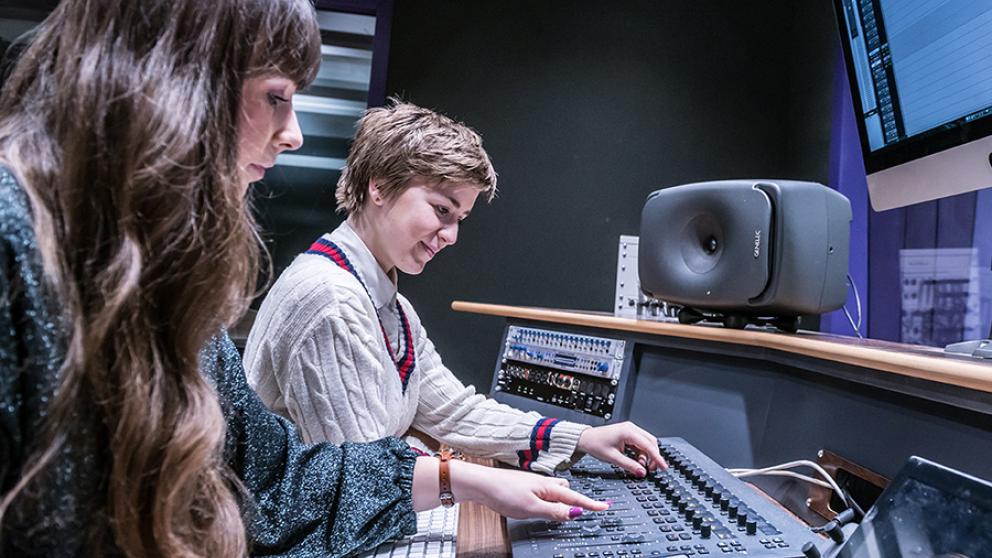
Why study at Salford?
We're proud to have a high-tech, sustainable and accessible campus at MediaCity. With iconic brands such as BBC, ITV and The Lowry on our doorstep, you'll be surrounded by a thriving creative sector.
Our focus is to ensure that you have the skills you need to pursue your dreams and we encourage our students, past and present, to collaborate with each other and achieve great things.
We're proud of all the equipment, hardware and software we have, but we know that it can be daunting if you're unfamiliar with it. No matter what level of experience you start with, our team of tutors and technicians will be able to help and guide you.
